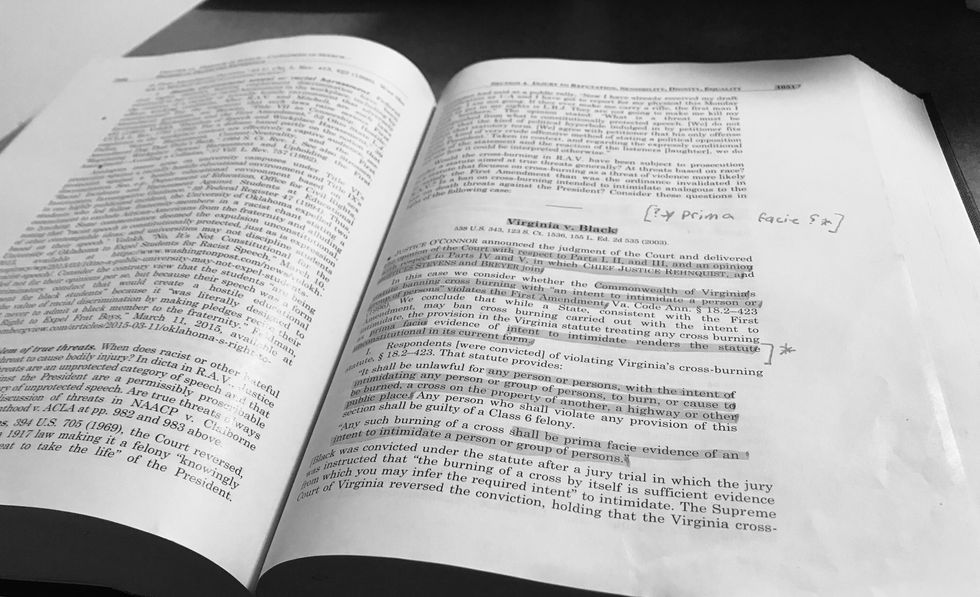With recent controversial events occurring throughout not only the United States of America, but the world as well, certain questions arise involving civil rights, liberties, and privileges. What I wish to specifically talk about, though, involves the question of the first amendment and hate speech.
I have talked to various individuals who have each defined the two as either issues completely unrelated or as uniform concepts. The purpose of this article is to dive a bit deeper into this narrative through a Supreme Court case you may or may not be familiar with--Virginia v. Black--that involves this subject from the perspective of a court setting rather than that of a protest or University Campus environment. I am neither saying this is correct or incorrect, but rather describing a statement of events and how I (and others) may interpret them.
The case in question, Virginia v. Black, involves the Virginia Supreme Court and whether banning the burning of crosses violates the first amendment.
Case Description Summary:
As described on Oyez.org, Barry Black, Richard Elliott, and Jonathan O'Mara were each convicted individually for the violation of Virginia law at the time: specifically, it is a "felony 'for any person..., with the intent of
intimidating any person or group..., to burn...a cross on the property
of another, a highway or other public place,' and specifies that 'any
such burning...shall be prima facie evidence of an intent to intimidate a
person or group.'" It was Barry Black who argued that the statute itself, was a violation of his first amendment rights.
This was eventually brought to the Virginia Supreme Court, who felt the enactment to be *overboard "because the probability of prosecution under the statute chills the expression of protected speech."
With this in mind, we must ask whether this is an act protected under the first amendment or not. Is such a law considered a violation of freedom of speech? Such questions were brought to the US Supreme Court, which in turn ruled in favor of Virginia, 7-2.
This ruling, however, was further clarified in regard to defining hate speech vs. protected speech. In regards to the term "Prima Facie" evidence, the act of considering (assuming) every burning of the cross as definitive evidence to terrorist action is unconstitutional. However, the act of burning crosses with such an "intent to intimidate" is.
Just as intent is the line between manslaughter and murder, so too is it the absolution between hate and protected speech.
With recent events, though, I cannot help but wonder how such a ruling would proceed in present time. Is proof of intent enough of a definitive ruling? Should it be?
I feel that if I had analyzed this case two or three years ago, I would've concluded similarly with the Justices; to ban the act of burning crosses (in itself) is unconstitutional (just as making it illegal to burn the American Flag). You must be able to prove the subject in question had malevolent intent to threaten and/or intimidate.
In my mind, though, intent is more than a case of declarative action here. The act of burning a cross, specifically in American History, is tied so deeply--and so innately--into the throws of KKK terrorist attacks and threats: how can you separate the two? I would argue that you can't. That, specifically, the intent and the action are one in the same.
Whether you agree or disagree, I would love to hear your opinions on this matter. I honestly have no answer. Share, comment, debate, and question; it is in your right to do so.






 The minimum wage is not a living wage.
StableDiffusion
The minimum wage is not a living wage.
StableDiffusion
 influential nations
StableDiffusion
influential nations
StableDiffusion












